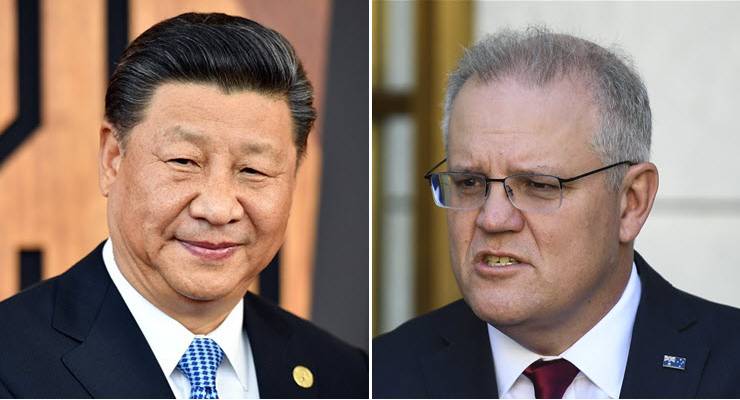
Some months back one side of the Australia-China spat got personal when the Morrison government called for an independent review into the origins of the COVID-19 pandemic infuriated President Xi Jinping and his entourage. State media People’s Daily issued a fierce editorial.
This week the Australian side grew personal when Prime Minister Scott Morrison called a press conference to shame China for what he called a “repugnant post” published on a Chinese government Twitter account. Morrison was clearly offended.
A long-running bilateral dispute over diplomacy and trade now involves two men who feel personally aggrieved. It’s not a good sign.
Looking back, a dispute that had been simmering for four or five years came to the boil in April when Foreign Minister Marise Payne called for an independent review into the origins and spread of COVID-19.
Beijing responded emphatically. Xi had placed himself head and centre of China’s pandemic response and any questioning of its role in the matter struck at his credibility. So that call elicited a higher-order response than any that had come before.
In years past public reprimands from Beijing tended to be random and inconsistent. Australian government comments on the South China Sea and East China Sea, and decisions on foreign interference and Huawei, made for some awkward moments in the relationship but they were generally isolated and contained.
Payne’s call for an inquiry prompted a far more coordinated response from Beijing. First came a warning from China’s ambassador Cheng Jingye that education and tourism and trade in general would suffer if Australia persisted — not just one commodity or service industry but pretty well the whole trade portfolio. He was not far wrong.
Next, Communist Party leaders developed a comprehensive communications strategy that branded Australia an irredeemably racist country in thrall to US hegemony. They disseminated this simple two-pronged message methodically through different arms of government and its propaganda system, home of People’s Daily. The recent Foreign Ministry tweet hewed close to this script.
Beijing notified the world of its consolidated approach to Australia in a strongly worded editorial in People’s Daily on April 28, published under the byline Zhong Sheng or “Voice of the Centre”.
This byline is reserved for editorials signalling central party views on important matters of foreign affairs — it could be read as the voice of Xi one or two steps removed. The editorial charged Australian media with racist behaviour for associating the COVID-19 pandemic with China.
Travel warnings soon followed. On June 5 China’s National Ministry of Culture and Tourism issued a travel alert to visitors to Australia warning of “a significant increase” in racial abuse and violence. Four days later the Education Ministry issued a similar warning to students planning to study in Australia.
A Foreign Ministry official said: “Some Australian politicians and media called the coronavirus a ‘Chinese virus’ and maliciously tampered with the Chinese national flag and national emblem.”
China’s Global Times added the American connection for good measure, with a claim Australian political leaders were not to be trusted because they were “too easily swayed by US political attitude and too eager to win US favours”.
The Zhong Sheng editorial signalled a game-changing decision on China’s relations with Australia at the highest levels of the party, reaching down to every government ministry, agency and state-owned enterprises.
The decision did not require evidence to support it. No amount of reasoned argument is likely to reverse it. It involves name-calling, shrill demands, and calls for apologies and retribution. Plainly Xi has been offended.
Significantly, a second Zhong Sheng editorial appeared in People’s Daily on December 1 defending the Foreign Ministry official’s doctored image.
In an apparent swipe at Morrison’s press conference, the high-level editorial alleged that “some” Australian politicians and officials were in denial over reports into unlawful killings in Afghanistan, apparently in the belief that “those who killed innocent Afghan civilians and prisoners are guiltless, while it is wrong to condemn the crime” as the Foreign Ministry official had done with his tweet.
Beijing’s charge that Australian politicians are in denial over their own report into war crimes in Afghanistan does not stand up to scrutiny. It does not need to. Xi’s entourage has spoken. Australia’s problem is not the behaviour of its troops in Afghanistan, or xenophobia or racism, or timber weevil or tainted barley or the dumping of wine. Our problem is that we rubbed the Great Man the wrong way.
The question for Australia is why do we need to get angry too. The best way to deal with angry men is to ignore their provocations. We don’t need two of them.








Crikey is committed to hosting lively discussions. Help us keep the conversation useful, interesting and welcoming. We aim to publish comments quickly in the interest of promoting robust conversation, but we’re a small team and we deploy filters to protect against legal risk. Occasionally your comment may be held up while we review, but we’re working as fast as we can to keep the conversation rolling.
The Crikey comment section is members-only content. Please subscribe to leave a comment.
The Crikey comment section is members-only content. Please login to leave a comment.